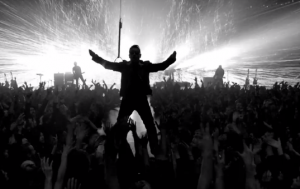(EDITORS NOTE: We would like to introduce our newest contributor to U2 Radio, Rachel W. the “Lieutenant”. She is a college student that has a passion for U2 lyrics, and literature in general. She will take us on a trip through the mysterious ways of U2’s lyric meanings, and interpretation.)
Have you ever been puzzled over a line like “I & I in the sky?” Have you ever listened to a song and thought that there was something there that you’re missing, something that’s like a lightbulb and goes over your head? (I know I have.)
If so, then this is the series for you!
In each future post, I’ll be looking over a different song by our favorite Irish rockers and seeing what meanings we can dig out of the lyrics. Because, of course, Bono almost never puts in just one interpretation.
Of course, the interpretations and analysis I share aren’t going to be definitive, and there is no “right” or “wrong” when it comes to music. These are just general, brainstormed ideas brought to you by someone who loves analyzing literature.
I’m going to start with “Invisible,” because, well, that’s where I started. Invisible was the song that changed U2 from being “that band that Mama liked in the ’80s that I recognize a couple songs from” to being “that band whose albums I desperately have to look for everywhere.” For me, listening to “Invisible” was when “the room just cleared of smoke.”
The first thing I have to point out about “Invisible” is the sound of Bono’s breathing. What is so special about breathing? Well, it’s there. You can hear it. Could you hear his breaths on Achtung Baby, for example? No. Could you hear it on How To Dismantle An Atomic Bomb? No. But you can hear his breathing in Invisible, and you can hear it in Songs of Innocence, too.
In the days of Auto-Tune and digital modification, it would be all too easy to cover up the breath sounds, or at the very least, to scale them back. But they weren’t covered up, and you can hear them clearly. You can breathe along with Bono!
There’s no way that this wasn’t intentional. I highly doubt that this was coincidence, especially since Songs of Innocence is styled as a personal and relatable album. For lack of a better way to phrase it, I would say that the sound of breathing humanizes the voice we hear on the tape…er…recording. It seems to be there to remind us that the voice we’re hearing isn’t just a singing automaton or a digital rendering or some untouchable figure behind a screen; the voice is a real, live, breathing person. A person that we may not see—but we will. Because he is not invisible.
Which brings us to our main subject: the lyrics.
 In a lot of ways, this song is pretty concrete for a U2 song. Bono has already said in an interview with The Guardian that the song was inspired by the feeling of irrelevance that comes when you’re around “extraordinary people” and needing to be heard. He also said in an interview with Rolling Stone that the line “there is no them” is about unity with the audience while performing, and of course, that the line about not being his father’s son is a reference to his name change.
In a lot of ways, this song is pretty concrete for a U2 song. Bono has already said in an interview with The Guardian that the song was inspired by the feeling of irrelevance that comes when you’re around “extraordinary people” and needing to be heard. He also said in an interview with Rolling Stone that the line “there is no them” is about unity with the audience while performing, and of course, that the line about not being his father’s son is a reference to his name change.
And we can’t forget that this song was released for (RED), and it’s not hard to interpret the lyrics as being about an AIDS patient. In fact, back when I knew absolutely zilch about U2 other than their Irishness, I assumed that it was written exclusively about AIDS.
After all, how often has the plight of AIDS patients been invisible to society, especially in the ’80s? Before the disease was understood, how often did fathers disown sons and how often did society ostracize AIDS patients out of fear? Even today, the people in Africa, the people that (RED) is primarily designed to help, too often go unthought-of by the rest of the world.
Yet those are just the surface of the possible interpretations. The great thing about songs is that, the more you listen to them, the more you get out of them, and sometimes you never quite get the same meaning twice.
Lately, I’ve gotten a little more involved in a local soup kitchen and more aware of the poverty that surrounds the area I live in. There are homeless people here, sleeping underneath bridges and overpasses, but the town is so small that nobody is really aware of the problem. I happened to read an article in a Scottish newspaper last week that advised people on what to do if you encounter a homeless person and want to help. The key point of the article was this: don’t treat them like they’re invisible.
For people who change addresses daily and have had their hearts broken on more than one occasion (“I didn’t even want the heart you broke”), being treated as if they’re invisible must add insult to injury. I imagine that there must be times when they want to remind the passersby that they are “more than you see here,” because all people are “a body and soul,” whether they live under a roof or under a park bench. And getting out of being homeless and finding a way back to the lives they left behind must feel like “leaving the invisible world.”
Then again, “Invisible” could also be interpreted as a conversion experience. “It’s like the room just cleared of smoke” might be a way to describe the moment when the scales fall from a person’s eyes and he sees the truth. “I won’t be me when you see me again” sounds like a moment of rebirth; being born again as a new and changed person.
For someone who lives in a nation where Christianity is not accepted, “I won’t be my father’s son” could reflect being disowned and leaving one’s family behind, or it could also mean that the person is making a distinction between an earthly father and a heavenly one. The chorus fits this interpretation perfectly, because Christianity, along with most other religions, teaches that people are more than their physical bodies—they have souls, souls that transcend what we know in the tangible world.
For the second verse, the “frozen days” and “frozen ways” reflect the way things were before the conversion. I’ve spoken to many people who say that before they found God, the world was full of pain. Seeing that pain being taken away could be reflected in the lines “they melt away/ your face like snow.”
And then again, in a way, this is a song for everyone, because I think everyone feels irrelevant or insignificant sometimes, and everyone wants the world—and themselves—to know that they are not invisible. Maybe the song is about a relationship in which one feels invisible to the other person. Maybe the song is about a person who is dealing with problems at work or trying to reach out and give a voice to a charity, and no one will listen. And all you want to do is shout, “I am not invisible! I am here!”
Whichever interpretation you choose, whether the song is about a relationship or poverty or disease or religion or about feelings of inferiority in general, I think the most important part of the song is the last section: “There is no them. There’s only us.”
We’re all in this little world together, and any one of us could be stuck in the same situation that the “invisible” person we’re trying not to think about is in.
Lieutenant
Latest posts by Lieutenant (see all)
- We will run like a river to the sea - August 24, 2017
- Do You Feel Loved. Today? - June 18, 2017
- People like Bono, people like Finn Bálor - September 24, 2016



